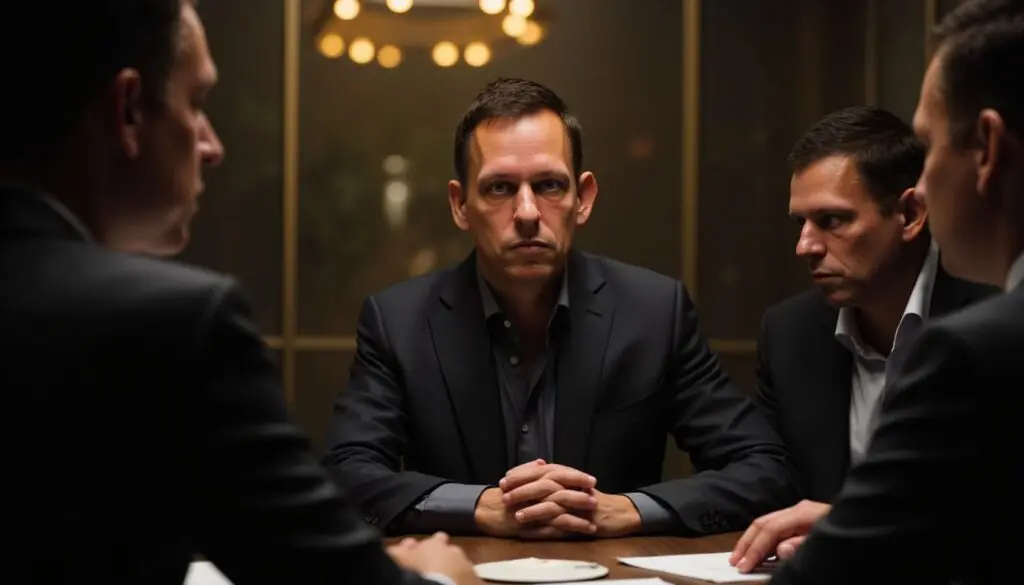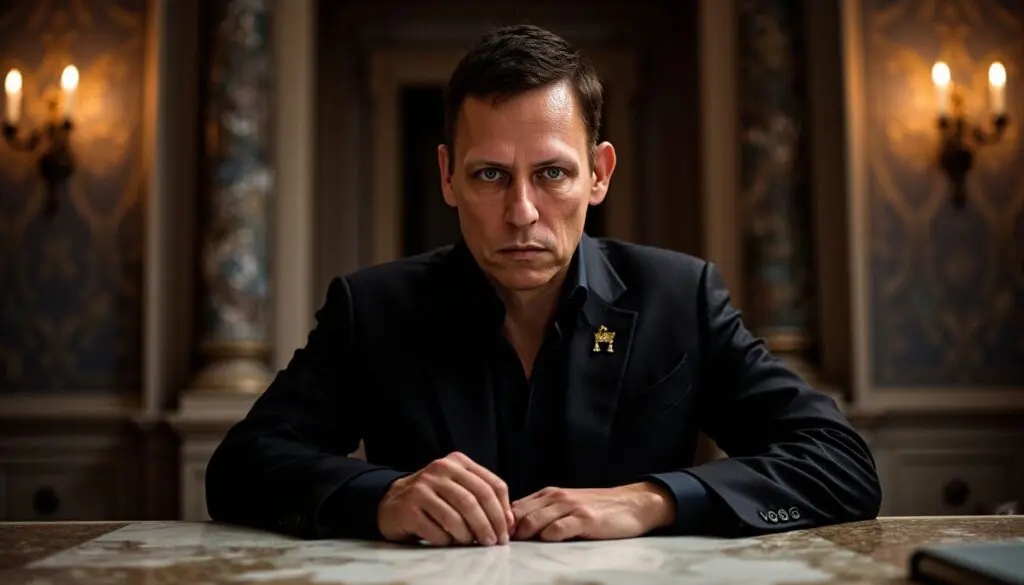Peter Thiel FAQ: The Contradictions of Silicon Valley’s Dark Philosopher
Peter Thiel occupies a rarefied place in the modern pantheon of tech billionaires — less the tinkerer or engineer than the theorist-king of the movement. A venture capitalist, PayPal co-founder, Facebook’s first major outside investor, and the billionaire backer of numerous reactionary causes, Thiel has built a career at the intersection of money, ideology, and myth. He is the financier of futuristic dreams — and dystopian nightmares.
Born in Frankfurt and raised in California, Thiel studied philosophy at Stanford, where he was captivated by the writings of Leo Strauss and René Girard. These thinkers — one obsessed with the hidden logic of political elites, the other with the contagious nature of human desire — shaped Thiel’s enduring worldview: that civilization is locked in cycles of envy and collapse, and only an enlightened few can see beyond the herd. In this sense, Thiel has always seen himself less as a businessman and more as a philosopher of power.
His ventures, from PayPal to Palantir, form a kind of metaphysical architecture of control. PayPal, the proto-financial infrastructure of the internet, made Thiel his fortune. Palantir, as explored deeper in What Is Palantir?, has monetized the surveillance state. In between, Thiel cultivated a cadre of disciples — the so-called PayPal Mafia — that went on to dominate Silicon Valley. His investments in companies like Facebook gave him not only wealth but leverage: a front-row seat in the grand experiment of data-driven social engineering.

But Thiel’s influence extends far beyond technology. He bankrolls candidates, think tanks, and movements aimed at reshaping our very democracy itself. In Peter Thiel and the Antichrist, I explored how Thiel’s quasi-religious futurism blends techno-eschatology with authoritarian politics — a longing for an end-times “reset” that he sees as necessary for renewal. His protégés, like Palmer Luckey and J.D. Vance, carry forward the same paradoxical ethos: rebellion against democracy in the name of “freedom.” As I argued in Palmer Luckey, Peter Thiel, and the Welfare Queens of Defense, his ventures often feed off the very government systems they publicly scorn.
Thiel has become the gravitational center of what I’ve called the reactionary Silicon Valley, a movement that cloaks its fear of decline in the language of innovation. He embodies the deep tension explored in The Tech Bros Have No Clothes: the belief that genius and wealth alone confer moral authority. In truth, his career reads like a case study in the seductive dangers of technocratic exceptionalism.
Peter Thiel FAQ
Who is Peter Thiel?
Peter Thiel is a German-American entrepreneur, venture capitalist, and political donor. He co-founded PayPal in 1998, launched Palantir Technologies in 2003, and was the first outside investor in Facebook. Beyond business, he is known for his far-right political views, deep skepticism of democracy, and financial backing of nationalist and authoritarian-leaning causes and projects.
What did Peter Thiel do at PayPal?
Thiel co-founded PayPal with Elon Musk, Max Levchin, and others, helping pioneer digital payment systems at the dawn of e-commerce. He served as CEO until eBay acquired PayPal in 2002 for $1.5 billion. Thiel’s $55 million payout became the seed capital for his later ventures — and helped create the so-called “PayPal Mafia,” a network of tech elites who went on to dominate Silicon Valley startups.
What is Palantir, and why is it controversial?
Palantir Technologies, co-founded by Thiel in 2003, builds data-analysis software for governments, intelligence agencies, and corporations. As detailed in What Is Palantir?, its platforms underpin systems for surveillance, policing, and military targeting — raising major concerns about privacy, civil liberties, and the rise of a digital panopticon.

How is Peter Thiel connected to Elon Musk?
Thiel and Musk were early rivals and later partners during the PayPal years. While they share libertarian instincts and a belief in “technological salvation,” their visions diverge: Musk dreams of escape — to Mars, to AI; Thiel dreams of control — of politics, of mortality, of markets. Their uneasy alliance remains one of mutual utility, not shared philosophy.
What are Peter Thiel’s political beliefs?
Thiel has called democracy “incompatible with freedom” and openly supported authoritarian-leaning candidates. He was a major donor to Donald Trump in 2016 and helped seed the ideological foundations for Project 2025 and other New Right ventures. His politics blend libertarian economics with reactionary Catholic integralism — a belief that Western civilization must be remade by a morally pure elite.
Who is Peter Thiel influenced by?
Peter Thiel’s worldview draws heavily from a constellation of reactionary philosophers and political theorists. Chief among them is Carl Schmitt, the former Nazi jurist who argued that politics is defined by the distinction between friend and enemy — a theme Thiel echoes in his disdain for democratic compromise and insistence on exacerbating conflict.
Thiel is also heavily influenced by Leo Strauss, the German-Jewish philosopher who emigrated to the United States and taught a generation of conservative thinkers. Strauss proposed that philosophers throughout history wrote in two layers: the exoteric, a public-facing surface meant for general readers, and the esoteric, a hidden message discernible only to an intellectual elite. For Strauss, truth was dangerous — too disruptive for the masses — and so it had to be coded, veiled within allegory or contradiction.
Thiel has long admired this Straussian method, which he interprets as a justification for elite rule: that democracy’s appearance of openness conceals an unavoidable hierarchy of understanding. This approach filters directly into modern right-wing populism, particularly through Thiel’s protégé and Vice President J.D. Vance, whose folksy anti-elite persona masks an underlying deference to oligarchic power. In their world, politics becomes a performance for the masses — the exoteric show — while the true strategy, the esoteric truth, unfolds quietly behind closed doors.
From René Girard, Thiel absorbed the concept of mimetic desire — the idea that human conflict stems from imitation and envy — which he reinterprets as a justification for building insular, self-protecting elites. And more recently, Thiel has been associated with Curtis Yarvin (a.k.a. Mencius Moldbug), the neo-reactionary blogger who envisions a post-democratic “CEO state.” Thiel has praised Yarvin’s work publicly, signaling an intellectual sympathy with the idea that democracy should give way to technocratic monarchy — a belief that places him squarely in the lineage of modern authoritarian theorists.
Why does Thiel invest in defense and surveillance startups?
Thiel argues that technology is the key to preserving American dominance, but his portfolio reveals what I think is a deeper motive: profit from power. Companies like Palantir and Anduril (founded by Palmer Luckey, another Thiel protégé) thrive on federal contracts — the very “big government” spending Thiel publicly condemns. As I wrote about in Palmer Luckey, Peter Thiel, and the Welfare Queens of Defense, it’s a striking case of “anti-government entrepreneurs living off the state.”
What is Thiel’s connection to Christian nationalism?
Thiel has funded a constellation of figures and institutions promoting Christian nationalist and post-liberal ideologies — including think tanks that advocate for theocratic governance. His fusion of Nietzschean elitism and religious revivalism is a cornerstone of the new reactionary right: a world where “faith” becomes a tool for hierarchy rather than compassion.
What is Thiel’s role in longtermism and effective altruism?
Though not formally part of the Effective Altruism movement, Thiel’s ideology intersects with it through his interest in longtermism — the idea that humanity should prioritize distant futures over present suffering. As discussed in Longtermism and Effective Altruism Among Tech Billionaires, Thiel’s version of this philosophy tends to privilege the survival of the powerful few over the well-being of the many.
Why is Thiel interested in life extension and seasteading?
Thiel has funded research into anti-aging technologies and projects like the Seasteading Institute — an attempt to create floating, stateless cities outside government jurisdiction. These ventures reflect his enduring obsession with transcendence and escape — from death, from law, from democracy itself.

What are some major criticisms of Peter Thiel?
Critics argue that Thiel embodies the moral paradox of Silicon Valley: preaching libertarian freedom while building systems of surveillance and control. He’s been accused of manipulating politics to serve plutocratic ends and of using wealth as a weapon against dissent — most notably in his secret funding of lawsuits that bankrupted Gawker Media.
Conclusion: The Philosopher of Control
Peter Thiel presents himself as a prophet of innovation — but his real project is domination. His career reads like a fable of our time: the philosopher who mistook power for wisdom, wealth for virtue, and control for truth. As I wrote in The Tech Bros Have No Clothes (and others more powerful than I agreed), the myth of meritocracy has curdled into an aristocracy of capital. Thiel’s legacy — whether in politics, technology, or philosophy — will likely be measured not by the worlds he builds, but by the freedoms they are quietly erasing.
Comments are closed.